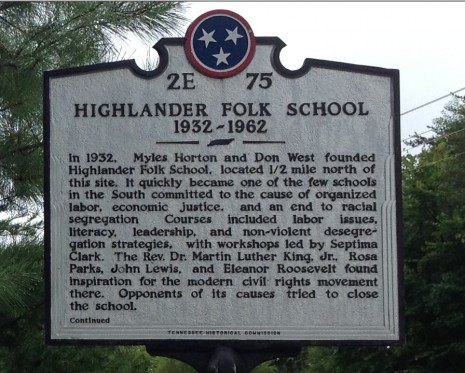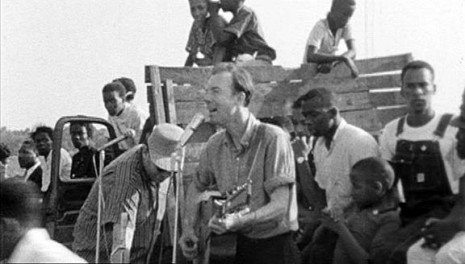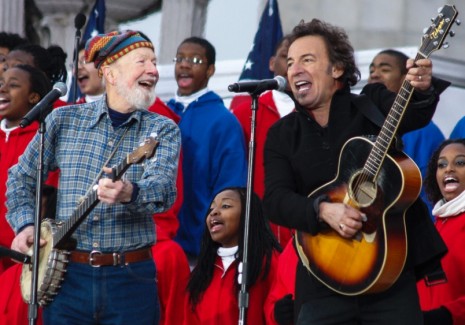Its coming around to that time of the year when we raise our fists in the air and sing “Longsho” (Arise!). I’m sure there is no argument, even from the most anemic Middle Path-er that this rousing ballad, sung at all March 10th gatherings and demonstrations, has helped exile Tibetans to hold on to their resolve for over five decades now.
But there aren’t many other stirring revolutionary songs in the Rangzen songbook. That’s probably why the American Civil Rights anthem, “We Shall Overcome”, appears to have been inducted to serve our struggle. I don’t know how true this is but an article in the Nation mentioned that the Tibetan Youth Congress sang ‘We Shall Overcome’ after its meetings. The Tibetan Women’s Association can be seen on You Tube singing it at a Candlelight Vigil. I also came across this video of a solitary Tibetan protest-singer/busker playing a dranyen and singing “We Shall Overcome” at a street corner in Seoul, South Korea, of all places. The singer, Kharag Penpa la, had even composed a verse in Tibetan that while retaining the spirit of the original lyrics, made a clear and simple declaration of his belief that Tibet would win independence someday. I found it very moving.
Ngatso Rangzen thopki ray, Ngatso Rangzen thopki ray
Ngatso Rangzen thopki ray – ye-che yod
Sem la ye-che yod, ye-che tsangma yod
Nyin-chik rangzen thopki ray
.
We will win independence, We will win independence
We will win independence – this I believe
I believe in my heart, I believe absolutely
We will win independence, one day.
Penpa la’s rewriting of the English lyrics is in keeping with the conventions of such traditional music. The original American song is itself an adaptation of an early Gospel song that was considerably re-worked and altered, both in its lyrics and melody, to become the anthem of the American Civil Rights Movement. This retrofitting was done at the Highlanders Folk School at Monteagle, Tennessee, where throughout the fifties labor organizers and civil rights activists, including John Lewis, Rosa Parks and Martin Luther King Jr. were trained and supported. The school even received a visit from Eleanor Roosevelt.
But white-supremacists and hate-mongers in the state government forced its closure in 1961. Some of the houses including the home of the founder, Myles Horton, were burnt down. A preacher at a local church confessed on his deathbed that he had incited the mob. All that’s left of the school is the main building and a barn where they had a small library whose first volumes were donated by Upton Sinclair. Behind the barn is a small pond which was the school’s infamous “integrated swimming pool”. Its now all closed and deserted, but something of the past still clings to the place. Its just a few miles away from my house and I drive by it sometimes. Makes me think of calling up SFT and suggesting they hold an “action camp” there.

One of those responsible for adapting “We Shall Overcome” at the Highlanders school was the legendary folk singer and the pole-star of American political activism, Pete Seeger. When Martin Luther King Jr. first heard Seeger’s version at Highlander, he endorsed it as a song “that really sticks with you.”
Pete Seeger died last month on January 26 at the age of 94. His songs meant a lot to me as a boy. If you had gone to a Christian school in India as I and many other young Tibetans did in the fifties, sixties and seventies, you were were practically raised on songs that Pete Seeger had written, co-written, adapted or popularized. We heard them on Indian record labels in versions sung by commercially more popular artists as Peter Paul & Mary, The Kingston Trio, The Byrds, Joan Baez and others. These were positive uplifting songs but had enough of a subversive edge to make them memorable: “If I had a Hammer”, “Turn Turn Turn”, “Where Have All the Flowers Gone”, “The Lion Sleeps Tonight”, “Kumbaya”, “Irene Goodnight”, “Guantanamera” and so many others.
In America in the forties Pete Seeger was a fixture on nationwide radio. He also had a string of hit records during the early 1950s as a member of the Weavers, and before that the Almanac Singers, with Woodies Guthrie. Pete Seeger’s music had always embodied his political and social beliefs. He sang with Guthrie to support workers, farmers, and unions; to oppose fascism in Spain and to condemn Hitler and Mussolini. In the fifties and sixties he sang with Cisco Houston, Bob Dylan, Joan Baez, Arlo Guthrie and Richie Havens for the Civil Rights and the Anti-War movements. He risked his life touring the deep south with the Student Nonviolent Coordination Committee (SNCC) the “shock-troops” of the Civil Rights movement, teaching and organizing black southerners to oppose segregation. He kept up his activism for human rights, social justice and environmental protection well into the twenty-first century, singing with Bruce Springsteen against the Iraq War.

He joined the American Communist Party but left it in 1949, growing disillusioned with Stalin. He wrote a song “Big Joe Blues” condemning “Uncle Joe’s” cruelty and oppression. When he was subpoenaed to appear before the House Un-American Activities Committee in 1955, he courageously refused to inform on his friends and acquaintances and refused to answer questions about his philosophical, religious or political beliefs, stating that these were his private affairs. He was charged with “contempt of Congress” and blacklisted for 17 years from radio and TV. He also appears to have been regularly harassed by the FBI and subjected to a range of petty persecutions, once being asked to sign a loyalty oath before singing to school children. But Pete Seeger never gave in to the blackmail, and never gave up his musical and social mission.

In 1994 President Clinton presented him with the Kennedy Center Honors. In 2012 Pete Seeger and Bruce Springsteen sang at President Obama’s inauguration, the song being Woodie Guthrie’s “This Land is Your Land”. But official honors and recognition does not seem to have lessened his anger at social injustice and his commitment to fighting it. At the age of 92 he marched with two walking sticks over 30 blocks in Manhattan to support the Occupy Wall Street movement. Seeger was joined by singer Arlo Guthrie, the son of his old friend Woodie Guthrie, and they performed a version of “We Shall Overcome” with the 1,000 odd protesters repeating the lyrics after them.
We shall overcome, We shall overcome,
We shall overcome, some day.
Oh, deep in my heart, I do believe
We shall overcome, some day.
Someone (I include myself in this) should have had the foresight to invite Pete Seeker to sing “We Shall Overcome” at a March 10th rally in New York City . I have no doubt he would have come. He lived not too far away in Beacon, NY. Being the kind of man he was, he would gladly have sung the Tibetan lyrics if you told him what “Rangzen” truly meant to those suffering under Chinese rule. That the “R” word is now taboo in high-level exiles circles wouldn’t have discouraged him. It might, in fact, have provoked him to belt it out even louder, and also call on everyone at the rally to sing along with him (something he regularly did at his performances).
“All together now
Ngatso Rangzen thopki ray, Ngatso Rangzen thopki ray
Ngatso Rangzen thopki ray – ye-che yod
Sem la ye-che yod, ye-che tsangma yod
Nyin-chik rangzen thopki ray.”
( Tibetan activists, singers and musicians who want to know what to do for the struggle might find an answer or two in this wonderful documentary “Pete Seeger: The Power of Song” on PBS. http://video.pbs.org/video/2365166823/)



Thanks for another inspiring piece.
Can you do an article on South East Asia and China and how are missing opportunities because of Kashag’s China appeasement policies prostrating for a dialogue ?
Dharamsala may try as hard as possible to ban the “R” word, but many of us will never, never give up. May be the thought police in Dharamsala will now ban the T-Shirts bearing those never give up slogan. It is an advice from none other than His Holiness the Dalai Lama: Never to give up.
The thing that doesn’t fit is the thing that is most interesting. (Richard Feynman)
To kill an error is as good a service as, and sometimes even better than, the establishing of a new truth or fact. (Charles Darwin)
All truth passes through three stages. First, it is ridiculed, second, it is violently opposed, and third, it is accepted as self-evident. (Arthur Schopenhauer)
Thanks again JN -la.
Spain orders arrest of former Chinese president, others over Tibet
http://www.reuters.com/article/2014/02/10/us-china-spain-idUSBREA1911W20140210
A-rok Karze la:
From one freedom fighter to another, Thanks You for the great news. Let us dedicate this news to our people who self-immolated for Tibetan nation.
I think Pete Seeger started out as a communist (Stalinist) sympathizer out of wanting to fight ALL the social injustices more than anything else.
I remember one of the Indian versions of “This Land” started out : “This Land is your Land, This Land is my Land, From the Himalayas down to Cape Comorin”…..perhaps there will be a Tibetan version too.
I am sure there are many Tibetan Peter Seegers out there who will sing and play their message till the very end.
Tsundru la there is a Tibetan version that JN wrote I think when he was director of TIPA. It goes something like: Phayul dhi ngatso tsangmay ray. Shar Dhartsedo nay something something.
But of course ……..thanks DAWALA.
I am sure Jamyang Norbula or another TIPA member will post the words to the Tibetan version in due time ……..
Tsunddru la, JN and some of his friends sang the Tibetan version of This land is your land in Dharamsala. The lyrics, I have been told, was written by the group with the help of Namkha la who helped translate the song. The song has been covered by TIPA and is now sung at various gatherings and SFT events. You can google the song but here’s the lyrics I got somewhere.
La thonpoe tse la
Lhasang chik tang pae
Dharchok shik lang ney
Lha gyajin khyenpae
Lha choekyong sungmae
Di ngala sung jung
Phayul di ngatso tsangmae rey
CHORUS:
Bod di kye kyi rey
Bod di nge kyi rey
Shar Dartsedo ney
Tod Ngari kor sum
Jhang Tso Ngonpo ney
Lho Kongpoe shingnak
Phayul di ngatso tsangmae rey
Ta lungshok rag pa
Jhangthang la shon due
Lung silpoe nyam du
Sang khampae drima
Nam ngonpoe nang nae
Jha jhewue shey jung
Phayul di ngatso tsangmae rey
“CHORUS”
Lo mangpoe jey la
Nga nang la dro due
Ser tonkae drushing
Shingpa tsoe ngadue
Shey nyenpo tang jung
Tam nyenpo shey jung
Phayul di ngatso tsangmae rey
“CHORUS”
Yul mangpo kor nay
Lhasa la lep due
Changkhang la chin pae
Drokpo tso jel jung
Chang shinpo thunk ney
Lushay di len song
Phayul di ngatso tsangmae rey
“CHORUS”
We sang the song in the late seventies at TCV. The kids enjoyed it. Lhasang Tsering la and myself were accompanied by Gyen Tsering la, Gyen Tenzin Sangpo la,Gyen Jampa la and Gyen Namkha la.
Lhasang la and I wrote the lyrics. It was inspired by Woodie’s Guthrie’s great song but was not a translation. Namgyal Shastri la edited our composition.
A few days ago someone Tenzing Kalsang la of Toronto, posted an audio file of the song on Facebook when we first sang it at TCV. I can’t seem to access it any more. Tenzing Kalsang la, could you please send me the file. Thukche che!
Tashi Deleg – Good morning – Norbula & Jamyang Norbula.
That was fantastic – thank you for the lyrics!
Here is a link to the song by Tibetan children in Portland.
http://www.youtube.com/watch?v=dDYrnDzRecA
By way of trivia, during the Newport Folk Festival 1965 where Dylan famously went electric, Pete Seeger is supposed to have grabbed an axe and attempted to cut off the cables of the music system, prompting Dylan to say that Seeger’s response was like a ‘dagger in his heart.’
This is a message from Tenzin Kalsang la on Facebook.Check out the audio file. JN
“Thank you for this article and the time travel, JN La. Thoroughly enjoyed it. And here’s the version of Woody Guthrie’s “This land is your land” that you, along with Lhasang La and a few others recorded at a wooden cabin in Upper Dharamsala many moons ago”.
https://soundcloud.com/tenzi…/this-land-is-my-land-tibetan
From Tibet Corps ad : ( Sikyong Sangay’s Kashag’s the most urgent need )
(Looking for ) Interfaith Harmony and Dialogue Experts:
” The department of Religion and Culture is looking for an experienced person who has participated or has experience in- holding interfaith harmony dialogue within the international community, or in India with religious and political leaders, academics and intellectuals. ”
What a laughing stock we are turning ourselves into ? Oh sorry, I forgot, we should not criticize, lest Whiteiscolour would go ballistic and would have acid-reflux.
Good harmony – yes; H-A-R-M-O-N-Y @ # 10 & 11
Happy Independence day today Feb 13th!
Lha gyalo! BODH gyalo
I am the canditate they are looking for. I have read the CCP constituiton where concept of “harmony” is of paramount importance. I will “harmonize” everybody.
@11
The above link gave me a “Sorry we can’t find that Page” error. Since this song gave me some sort of yearning and desire to return back to Tibet. I’m posting the link again.
https://soundcloud.com/search?q=this%20land%20is%20my%20land%20tibetan
Just copy paste the link in your browser and there you go.
@11
Pema T.
The link given below would be the correct URL as it is posted by someone Tenzin Kalsang.
https://soundcloud.com/tenzin-kalsang/this-land-is-my-land-tibetan
The idea of inviting Pete Seeker to sing the song” we shall overcome” is not just great but AWESOME. If someone who( including Jamyung Norbu himself) stays somewhere in NY and has some sort of contacts with Seeker himself , then they should at least try to invite him. Because there is all the likelihood that he will , given the fact that he is a supporter of JUSTICE, come and sing the song with Tibetan protesters in one of the NY streets and I am sure that this protest will be widely spread.
what a trash
TO JN
The song we sang WE SHALL OVERCOME has got both meaning. the meaning of freedom in Tibet and Return of His holiness the dalai lama to tibet.
such a nice lyrics we have mentioned ..
WE SHALL OVERCOME SOMEDAY SOONER OR LATER .
Jamyang la, I enjoyed the song so much that i had to post it in youtube.
here is the link
https://www.youtube.com/watch?v=c1ohazp2BrU&feature=youtu.be
@ 21
Thanks for the youtube upload of the song. cool singing. Maybe somebody can give it a new tone and fervor and enthusiasm in this song. so many singers are there.